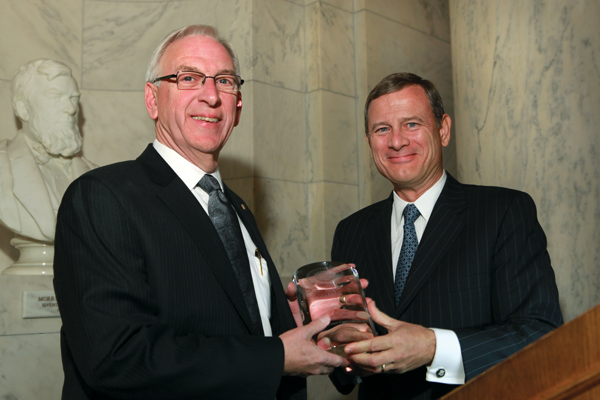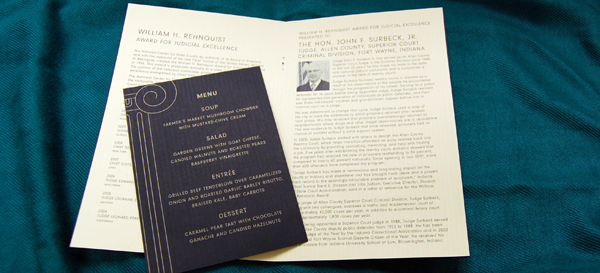Allen County Superior Court Criminal Division Judge John F. Surbeck, Jr. in November received one of the nation’s highest judicial awards. As the spotlight shone bright on Judge Surbeck, he used the moment to highlight the work of his colleagues on the bench. Indiana judges symbolically stood right next to Judge Surbeck as he accepted the honor at the highest court in the land. He said, “I don’t believe that this is all about me. It’s about the people of Allen County and the people of Indiana.”
United States Supreme Court Chief Justice John G. Roberts, Jr. presented the National Center for State Courts (NCSC) William H. Rehnquist Award for Judicial Excellence to Judge Surbeck in front of family, friends, colleagues, staff and members of the Indiana General Assembly. Indiana Chief Justice Brent E. Dickson introduced Judge Surbeck to the attendees. He noted, “Time limits us to highlight only Judge Surbeck’s major accomplishments, but the more you get to know about Judge Surbeck, the more there is to admire about him.”

As the founder of Indiana’s reentry courts, Judge Surbeck is considered a national trailblazer in the field. His commitment to reentry courts began when he realized the cycle of crime in his community. As a public defender he represented individuals facing criminal charges, only to see those individuals’ children and grandchildren appear before him years later when he became judge. He was determined to change that cycle.
In 2000, Judge Surbeck worked with others to design the Allen County Reentry Court, which helps transition offenders on early release back into the community. The court provides counseling, mentoring, and help with finding a job. In his remarks in Washington, D.C., Judge Surbeck called attention to the importance of the support he’s received from the Indiana Supreme Court and the Indiana Judicial Center. He said, “They have created an environment in Indiana where judges are encouraged to innovate to improve our justice system.”
Five years after establishing the court, statistics showed the program had reduced the rate of prisoners reoffending to 34 percent, compared to nearly 60 percent nationally. The success of the Allen County model prompted Judge Surbeck to seek state legislation that authorized all Indiana courts with criminal dockets to institute similar programs. Indiana State Senator Thomas J. Wyss and Indiana State Representative Winfield Moses congratulated Judge Surbeck in person at the ceremony. Judge Surbeck worked with them and others in the Indiana General Assembly to offer the program statewide by showing how a reentry court not only rehabilitates offenders and thus enhances public safety, but also produces significant cost savings for taxpayers.
“Judge Surbeck has made a tremendous and long-lasting impact on the courts of Indiana and elsewhere and has brought fresh ideas and a proven track record to the seemingly intractable problem of recidivism,” Chief Justice Dickson and Lilia Judson, Executive Director, Division of State Court Administration, said in a letter of support for the award.

The letter resonated with the NCSC, who selected Judge Surbeck for the prestigious award. President Mary C. McQueen pointed to Judge Surbeck as an inspiration for others working in the justice system and said, “He has accomplished what most of us set out to do with our lives—he’s making a true difference in the lives of others. Those who work with him, refer to Judge Surbeck as a pioneer and a trailblazer in the field of reentry courts. I would add that he’s also a proven leader for the nation’s court community when it comes to integrity and judicial innovation.”
Judge Surbeck humbly pointed to the reason for his dedication—since opening in July 2001, more than 600 offenders have completed the program. With benefits to Indiana citizens apparent, accolades from colleagues and friends, and a handshake from the United States Supreme Court Chief Justice, the reception was a moment for Judge Surbeck to reflect on his work and a moment for all Indiana judges to take pride in their state.